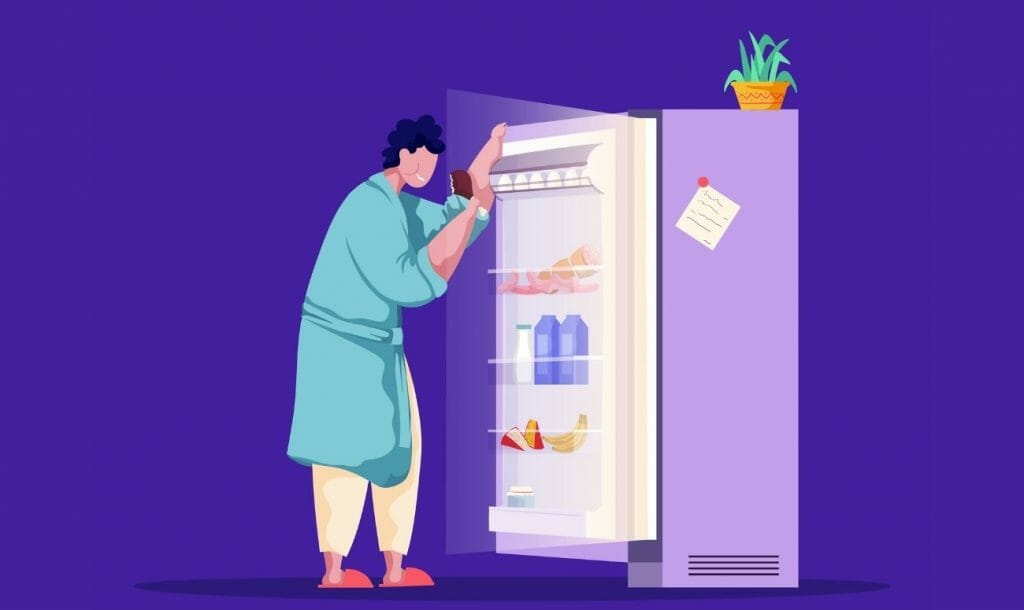Have you ever had a strong urge to eat right after dinner? Or when you wake up in the middle of the night? It can be normal to want to snack during such AM hours. But for some people, snacking at night can develop into a repetitive behavior with serious consequences. If you find yourself eating large quantities of food at night—even waking up from sleep to eat—you may have a specific eating disorder, called night eating syndrome (NES).
What is Night Eating Syndrome?
Night eating syndrome is a type of eating disorder where you may wake up from sleep feeling a strong urge to eat. For some, it may also feel like they can’t go back to sleep without eating. Individuals with night eating syndrome (NES) often describe feelings such as lack of control over their eating behaviours, resulting in feelings of guilt and shame related to their condition.

Why it happens?
The exact cause of night eating syndrome is not clear yet but health experts have unveiled its link to addiction and depression. Those with NES are believed to often eat because it’ll improve sleep or help them fall back asleep. One theory is that night eating syndrome involves a disruption in the hormones that regulate sleep, appetite, and mood – specifically, an alteration or disruption in the hypothalamic-pituitary-adrenal axis.
There may also be a number of contributing factors to night-eating syndrome. Hormone imbalances that disrupt eating patterns may also contribute to night eating syndrome. It also may develop in response to a pattern of staying up and eating late at night, often common among college students. Those with this condition may also be high achievers who work through lunch and eat a heavy “comfort meal” at night as a response to stress bottled up during the day.
In some cases, night eating syndrome can also be viewed as a response to dieting. With restriction of calories during the day, some overcompensate at night by eating greater amounts of unhealthy meals.
What are the consequences if left untreated?
Often people with night eating problems might not even realize they may have a disorder but it can severely interfere with quality sleep and may impact other parts of their health. In the long run, it can lead to serious medical problems including weight gain, diabetes, elevated blood pressure among other things.
How to identify triggers and signs?
Those with night eating syndrome typically eat rapidly, eating more than most people would in a similar time period, and may also feel a loss of control over their eating. Some may eat even when they are not hungry and continue eating even when they are uncomfortably full. Feeling embarrassed by the amount they eat; they typically eat alone to minimize their embarrassment. They often feel guilt, depression, disgust, distress, or a combination of these symptoms.
Another pattern that’s observed is those with night-eating syndrome eat a majority of their food during the evening. They generally eat little or nothing in the morning, and wake up during the night and typically fill up on high-calorie snacks.
Traits of patients with night-eating syndrome may include being overweight, frequent failed attempts at dieting, depression or anxiety, substance abuse, concern about weight and shape, perfectionism and a negative self-image.
How can you better manage your night time eating habits?
Anxiety and stress are common catalysts for people with NES and can make it difficult to relax in the evening. If you notice that you eat when you are anxious or stressed, try to find another way to let go of negative emotions and relax. Consider trying relaxation techniques such as yoga, meditation, hot baths, stretching, and breathing exercises to regulate your emotions. Mindfulness meditation will not cure an eating disorder but it will help you understand and examine underlying sensations that could lead to this disorder.
There are several reasons to believe yoga may be helpful for patients with such eating disorders. Those who suffer from eating disorders have a negative and distorted body image and yoga emancipates one to accept themself as they are and inculcates a sense of peace within. And instead of focusing on an external image of themselves, yoga helps patients experience their bodies internally, mindfully, and non-judgmentally. It incorporates the practices of relaxation, mindfulness, and breathing strategies that alleviate anxiety related to eating disorders.
Overeating at night has also been linked to erratic eating patterns that can often be categorized as disordered eating. Not making time for or “forgetting” to eat earlier in the day, intensifies hunger cues in the evening. Eating at planned intervals throughout the day in line with “normal” eating patterns can also help keep your blood sugar stable.

Eating disorders such as NES can be seen as adaptive behaviours that become disorders over time. One major aspect of mindfulness that is customized for eating disorders is the fact that it enables us to manage thoughts that lead to judgment. Hence, practicing mindful eating creates awareness in the present moment without judgment, before, during, and after eating. Creating a healthy relationship with food is the first step to building a long-term sustainable model of healing from an eating disorder. Mindful eating involves eating slowly and without distraction, listening to physical hunger cues and eating only until full, consciously distinguishing between true hunger and non-hunger triggers, engaging your senses by noticing colours, smells, sounds, textures, and flavours, learning to cope with guilt and anxiety about food, eating to maintain overall health and well-being, noticing the effects food has on your feelings and figure and appreciating your food completely.
When you feel like snacking, and catch yourself reaching for high fat, high sugar and highly processed foods, try to lim it your consumption. Stock up your house with snack-friendly nutrient-rich foods such as fruits, nuts, berries, plain yogurt and cottage cheese to cut down on junk consumption.
What treatments are available for NES?
Often educating patients about their condition is an important first step in therapy for night eating syndrome, primarily so they develop a greater awareness of their eating behaviors and track the triggers that influence how they eat. But in most conditions, a patient might require more than one treatment to cure NES.
Apart from a mix of therapies, potential treatments of night eating syndrome may include nutrition assessment and therapy, cognitive-behavioral therapy (CBT), exercise physiology, dialectical behavioral therapy (DBT), interpersonal therapy (IT) along with management of stress.
Online support groups as well as individual counseling may also help patients reduce symptoms and gain independence and control over the syndrome.
If you think you may have night eating syndrome, talk with your healthcare provider or a mental health expert. They can help you understand the condition better and support you with ways to change your night eating patterns.
If you struggle with sleeping well at night, try listening to this soft meditation music for sleep.
Read more: Meet The Master: Ritu Gupta, An Expert Life Coach
Like & Follow ThinkRight.me on Facebook, Instagram, Twitter and Telegram to stay connected.






























